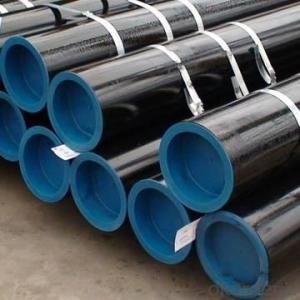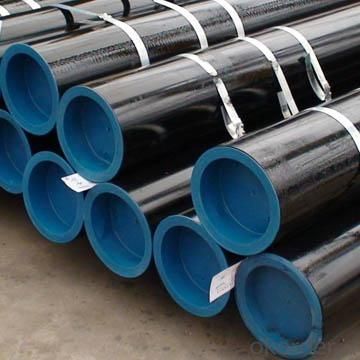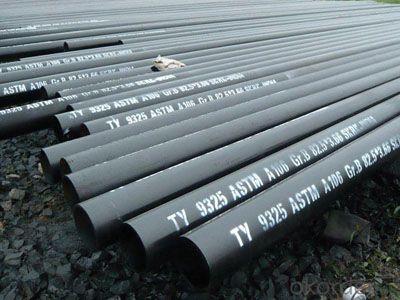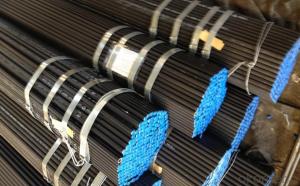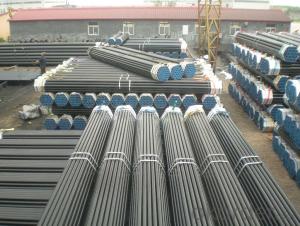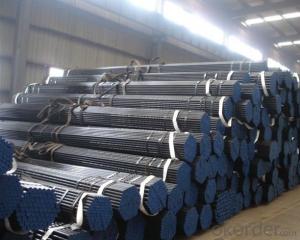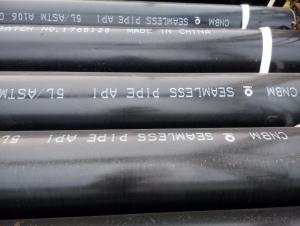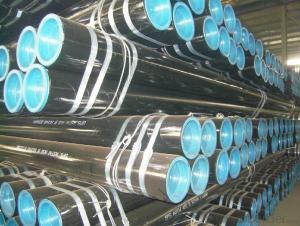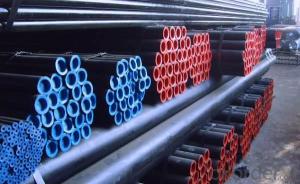ASTM A 106 Seamless Steel Pipe/Seamless Pipe/API Seamless Pipe
- Loading Port:
- Tianjin
- Payment Terms:
- TT or LC
- Min Order Qty:
- 25 m.t.
- Supply Capability:
- 10000 m.t./month
OKorder Service Pledge
OKorder Financial Service
You Might Also Like
We are company that have many years experience and professional manager team and engineer team and sales team, sure we will provide you high quality of pipe and professioanl service.
Seamless pipe possesses a hollow section and without seam around the strip steel. It is made with solid bar or steel ingot by perforating machine. As the facture process does not include any welding, seamless pipes are considered to be stronger and more durable. Generally speaking, seamless pipe has better pressure resistance and security than other classifications, and was usually more easily available than welded pipe.
2、Main Features of the Seamless Pipe:
• High working accuracy
• High strength
• Small inertia resistance
• Strong therming dissipine ability
• Good appearance
• Reasonble price
3、Seamless Pipe Specification:
Standard | GB, DIN, ASTM ASTM A106-2006, ASTM A53-2007 |
Grade | 10#-45#, 16Mn 10#, 20#, 45#, 16Mn |
Thickness | 8 - 33 mm |
Section Shape | Round |
Outer Diameter | 133 - 219 mm |
Place of Origin | Shandong, China (Mainland) |
Secondary Or Not | Non-secondary |
Application | Hydraulic Pipe |
Technique | Cold Drawn |
Certification | API |
Surface Treatment | factory state or painted black |
Special Pipe | API Pipe |
Alloy Or Not | Non-alloy |
Length | 5-12M |
Outer Diameter | 21.3-610mm |
Grade | 20#, 45#, Q345, API J55, API K55, API L80, API N80, API P110, A53B |
Standard | ASME, ASTM |
1) Material:20#(ASTM A 106/A53 GRB.API5LGRB,GB),45#,16Mn,10#.
2) Specification range: OD: 21.3-610mm, WT:6-70mm, length:6-12m or according to the requirement of clients.
3) Executive standards: GB, ASME API5L.ASTM A 106/A53,Despite of the above standards, we can also supply seamless steel pipe with standard of DIN, JIS, and so on, and also develop new products according to the requirements of our clients!
4) Surface: black lacquered, varnish coating or galvanized.
5) Ends: Beveled or square cut, plastic capped, painted.
6) Packing: bundles wrapped with strong steel strip, seaworthy packing.
4、Packaging & Delivery:
Packaging Details: | seaworthy package, bundles wrapped with strong steel strip |
Delivery Detail: | 15-30days after received 30%TT |
5、FAQ of Seamless Pipe:
①How is the quality of your products?
We have many years business experience in this area, and we have professional engineer and manager team and sure we can provide you high quality production and professional service.
②How about price?
Yes, we are factory and be able to give you lowest price below market one, and we have a policy that “ for saving time and absolutely honest business attitude, we quote as lowest as possible for any customer, and discount can be given according to quantity”,if you like bargain and factory price is not low enough as you think, just don’t waste your time.Please trust the quotation we would give you, it is professional one.
③Why should you chose us?
We can give you both.Additionally, we can also offer professional products inquiry, products knowledge train(for agents), smooth goods delivery, exellent customer solution proposals.Our service formula: good quality+good price+good service=customer’s trust
SGS test is available, customer inspection before shipping is welcome, third party inspection is no problem.
6、Seamless Pipe Images:
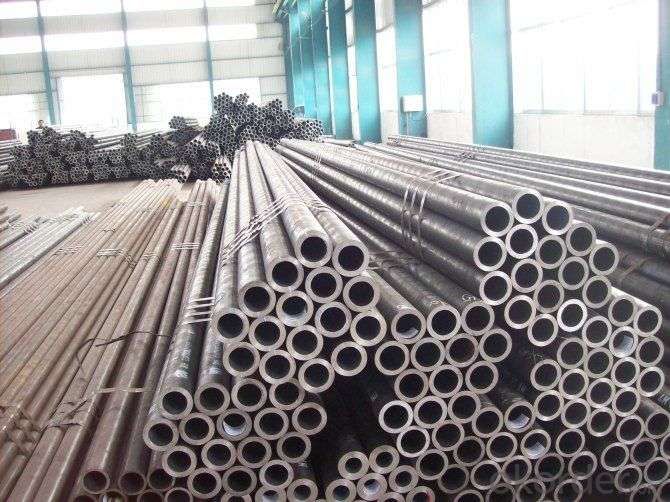
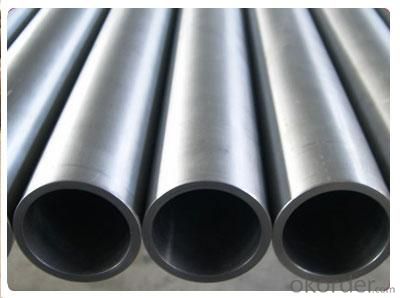
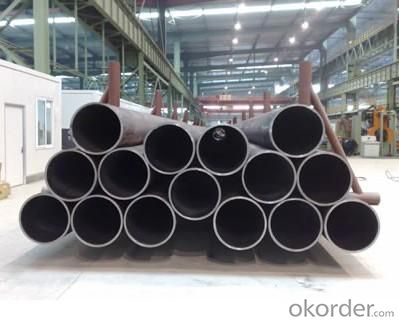
- Q: How do steel pipes perform in high-temperature environments?
- Steel pipes perform well in high-temperature environments due to their excellent heat resistance properties. They can withstand elevated temperatures without losing their structural integrity or strength. Additionally, steel pipes have low thermal expansion, which reduces the risk of deformation or cracking under extreme heat. This makes steel pipes a reliable choice for various applications in industries such as oil and gas, power generation, and chemical processing, where high temperatures are common.
- Q: What are the common applications of steel pipes in construction?
- Steel pipes are commonly used in construction for various applications such as structural support, plumbing, water distribution, gas transportation, and HVAC systems. They provide strength, durability, and resistance to corrosion, making them an ideal choice for these purposes.
- Q: Can steel pipes be used for structural applications?
- Indeed, structural applications can make use of steel pipes. With their high strength, durability, and ability to withstand various environmental conditions, steel pipes prove to be suitable for such purposes. The construction industry often relies on them to fabricate buildings, bridges, and other structures. Notably, steel pipes possess exceptional load-bearing capacity and can endure heavy loads, making them perfect for supporting structures and transferring loads. Moreover, the ease with which steel pipes can be fabricated, welded, and connected facilitates efficient construction. As a result, steel pipes emerge as a dependable and cost-effective choice for structural applications.
- Q: What are steel pipes used for?
- Steel pipes are commonly used for transporting fluids and gases, as well as for structural applications such as construction, oil and gas exploration, and plumbing systems.
- Q: How are steel pipes used in the manufacturing of oil refineries?
- Steel pipes are used in oil refineries for a variety of purposes, including transporting crude oil and other fluids, as well as for structural applications. They are commonly used for piping systems, carrying process fluids such as oil, gas, and water, throughout the refinery. Additionally, steel pipes are used to handle corrosive and high-pressure environments, making them essential for the safe and efficient operation of oil refineries.
- Q: Can steel pipes be used in high-pressure applications?
- Yes, steel pipes can be used in high-pressure applications. Steel pipes are known for their strength and durability, making them suitable for handling high pressures in various industries such as oil and gas, water distribution, and chemical processing.
- Q: How do you calculate the deflection of a steel pipe?
- To calculate the deflection of a steel pipe, you need to consider various factors such as the material properties, applied loads, and geometrical characteristics. The following steps can guide you through the process: 1. Determine the material properties: Obtain the necessary information about the steel pipe, such as its Young's modulus (E), which represents its stiffness or resistance to deformation. This value is typically provided by the manufacturer or can be found in material databases. 2. Analyze the applied loads: Identify the types and magnitudes of the loads acting on the steel pipe. These loads can include point loads, distributed loads, or a combination of both. Determine the location and orientation of the applied loads as well. 3. Evaluate the pipe's geometry: Measure or obtain the dimensions of the steel pipe, including its length (L), outer diameter (D), and wall thickness (t). Ensure that these values are accurate to achieve a precise calculation. 4. Select an appropriate calculation method: Depending on the complexity of the loading and support conditions, you may need to use either simple beam theory or more advanced structural analysis methods, such as the finite element method (FEM). 5. Apply the appropriate equations: For simple beam theory, you can use the Euler-Bernoulli beam equation to calculate the deflection at a specific point on the pipe. This equation is based on assumptions that the pipe is homogeneous, linearly elastic, and subjected to small deflections. For more complex scenarios, FEM software can handle the calculations. 6. Determine the boundary conditions: Identify the support conditions at both ends of the pipe, which can include fixed supports, simply supported ends, or combinations of both. These conditions significantly affect the pipe's deflection. 7. Calculate the deflection: Using the equations relevant to your chosen method and incorporating the material properties, applied loads, and geometry, you can calculate the deflection at specific points along the steel pipe. The deflection can be measured in terms of vertical displacement or angular rotation. It is important to note that calculating the deflection of a steel pipe may require specialized engineering knowledge and software tools. If you lack experience in structural analysis, it is advisable to consult a professional engineer to ensure accurate results and safe design.
- Q: Can steel pipes be used for bridge piling?
- Yes, steel pipes can be used for bridge piling. Steel pipes are commonly used for bridge piling due to their strength, durability, and resistance to corrosion. They provide a strong foundation for bridges, ensuring stability and longevity.
- Q: How are steel pipes protected against corrosion?
- Steel pipes are protected against corrosion through various methods such as coating them with corrosion-resistant materials like epoxy or zinc, cathodic protection using sacrificial anodes or impressed current systems, and maintaining a protective layer on the pipe's surface through regular maintenance and inspection.
- Q: How are steel pipes marked for identification?
- Pipe marking is a process used to identify steel pipes. This process involves placing labels or markers on the pipes' surface to provide important information about their specifications and characteristics. The labels typically include details such as the size, grade, material composition, manufacturer's logo or name, and any relevant codes or standards. These markings are crucial for proper identification and ensure that the right pipes are used for specific applications, as well as for maintenance and repair purposes. Furthermore, the markings also assist with quality control and traceability, making it easy to identify and track the pipes throughout their lifespan. In summary, using clear and durable marking systems to identify steel pipes is vital for safety, efficiency, and compliance in various industries where these pipes are used.
Send your message to us
ASTM A 106 Seamless Steel Pipe/Seamless Pipe/API Seamless Pipe
- Loading Port:
- Tianjin
- Payment Terms:
- TT or LC
- Min Order Qty:
- 25 m.t.
- Supply Capability:
- 10000 m.t./month
OKorder Service Pledge
OKorder Financial Service
Similar products
Hot products
Hot Searches
Related keywords
